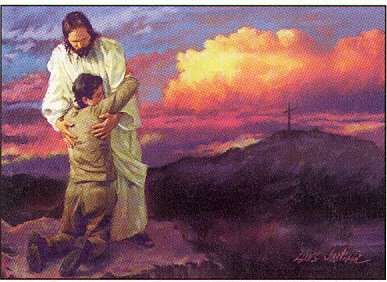by André van Heerden
(To Print)
Romans 8:17, 18
Now if we are children, then we are heirs--heirs of God
and co-heirs with Christ, if indeed we share in his sufferings
in order that we may share in his glory. I consider that our present
sufferings
are not worth comparing with the glory that will be revealed in us.
The Gift of Suffering--An Oxymoron?
The phrase, "The Gift of Suffering," is a contradiction
within itself--what is termed an oxymoron. A gift is something we desire,
while suffering is something we detest. Other oxymoron's would be "a good
criminal," or "an honest politician." Why would suffering be termed a gift.
There must be a mistake. If you were to take a survey to the streets, questioning
the public as to whether they would accept suffering as a gift, the overwhelming
majority would most decidedly say "no!" So what is the point of this discussion.
We will see in this discussion that suffering, in all its forms can be
accepted as a gift when the receiver has an intimate relationship with
God, based on a thorough knowledge of who He is and where He ultimately
wants to take us.
(If you walked onto the street and asked random people if they would accept a gift of suffering, they would all say "no!")
Would a Person Who Loves You Give You the Gift of Suffering?
Imagine that your best friend has a wonderful healing
ministry through prayer. Through an unfortunate turn of events, a close
member of your family contracts an incurable disease. You do everything
possible to call in the best doctors, but his conditions doesn't improve.
You research which alternative treatments to administer, but he shows no
improvement. You offer additional prayers to the ones you've already offered,
but there seems to be no reply. Then you remember your best friends ministry--the
awesome anointing that rests on him, and how God has healed countless people
in answer to his prayers. You send a message by the fastest means to him,
begging him to come and minister to your dying beloved. A day goes by,
two days go by and finally, the one you have love and have struggled to
keep alive, breathes his last. With a shattered heart, mixed emotions of
grief, anger and question, you gently close his eyes for the last time.
Instead of coming to pray for your loved one, your best friend gives you
the gift of suffering.
Imagine being imprisoned for your faith. You answered the call God sent you many years ago to preach and teach His word, and now, like the two girls that did relief work in Afghanistan, you were thrown into a dark, dingy, dungeon. A month goes by, two months go by and you start wondering if you really did the right thing by giving your life to God's cause. Then you remember your cousin, also called by God to minister for Him. You remember that he is in the vicinity busy with ministry. You send an urgent message, telling him you are in prison. In hope you wait for him to visit you. After waiting many days, you realize that he isn't coming. He has left alone and given you the gift of suffering.
Why Do the Innocent Have to Suffer?
I stood at the bed of a lady I hardly knew. Her face
pale and discolored. Countless tubes and needles were attached to her body
to supply feeding, oxygen and drainage. Her infection was so acute that
she had to be sedated in order for machines to perform all her bodily functions.
She had been given the gift of suffering. Every time I came to visit this
lady in the intensive care unit, I peeked into the other rooms. Beds of
suffering, occupied by people fighting for their lives. These scenes brought
the question to my mind again,"Why all this suffering, Lord? Why can you
not come down and end this misery among us?"

(When we see all the suffering around us, we can't help but ask, "Why God, why must the innocent suffer?")
Not too long before this, I met, an attractive middle aged lady. She told me that one morning she woke up and her husband told her that he didn't love her anymore. That same day, he packed his bags and left her and her twelve year old son to face life alone. The shock of this sudden change of events almost overwhelmed her. She had been given suffering as a gift.
"How could this be God?" I pondered again, "Where are you in times like these?" So the stories keep piling up, one after the next. Young children with broken hearts, as they watch their homes being destroyed by divorce. Unspeakable, soul-wrenching anguish as what seems to be the mouth of a hungry earth, swallowing the body of someone dearly beloved. Large-scale catastrophes steam roll cities and communities indiscriminately and mercilessly---insane shootings, interstate accidents, tornados, runaway forest fires, terrorist attacks, crime, earthquakes, floods, poverty and starvation, and the list goes on and on.
When our questions with regard to all the suffering around us aren't answered, our first reaction is to blame someone for it. Usually the first person we blame is God. "God, you can put a stop to this suffering, yet you don't. You are responsible for it!" When we have blamed God, we then blame the people that are the closest to our suffering--those who might have said something in error, or didn't say something at the right time, or hurt us intentionally or unintentionally.
When I was 4 years old, my father was killed in a tragic accident. I have even blamed my father for dying and leaving me without a father. The anger and frustration of having to grow up without the loving care and affection of a father came out in blaming whoever I could blame.
God's Word Offers a Solution to Suffering
And so, in desperation, after finding no answers to our
questions, no direction to our deliberations, and no one else to blame,
we open a book that is filled with insights, stories and statements about
suffering. The bible offers solutions to the solemn subject of suffering.
Between the covers of the bible, we find the best insights, enlightening
stories and encouraging counsel regarding suffering. Let's read the statement
made by Paul in the book of Romans chapter 8:

(Between the covers of the bible, we find the best insights, enlightening stories and encouraging counsel regarding suffering).
Romans 8:16, 17Verse 16 makes such a positive and encouraging statement. "We are God's children!" It goes on to say that as God's children, we are also heirs, and coheirs with Christ. This makes us eligible to inherit whatever Christ inherits--and note the condition--"if" we share in His sufferings. Paul teaches us that if we stand in line to receive Christ's inheritance, we must also stand in line to share what He went through while He was on this earth--suffering. Then he again repeats what the inheritance is--unimaginable glory. Could one say that suffering is a gift that has a bitter beginning and a magnificent ending?
The Spirit himself testifies with our spirit that we are God's children. Now if we are children, then we are heirs--heirs of God and co-heirs with Christ, if indeed we share in his sufferings in order that we may share in his glory.
Paul here places you and I on the same level as Christ--whatever Christ inherits, we inherit. What did Christ inherit? Christ inherited the sting that sin brought to a planet in rebellion. Christ inherited the consequences that are paired with separation from God. When mankind separated themselves from the kind, generous and loving God that made them, they automatically fell into a system that was unkind, selfish and cruel. When they moved away from the "Author of Life and Unselfish Service," they moved toward the "Author of Death and Selfish Slavery." This is what Christ inherited when He chose to take the sentence we deserve, so that we can receive the sentence that He deserves.
The Extent of Christ's Suffering
Scanning through Isaiah chapter 53 will give a brief
overview of the suffering that Jesus Christ endured.
Isaiah 53:3-5, 7-9, 10, 11We know that because of his unspeakable love and compelling passion for humanity, he suffered so much more than we could imagine. As his compassionate eyes beheld the impoverished and diseased masses, as his sympathetic ears heard their cries for help and as his tender heart sensed their pain, Jesus suffered with them. He suffered as men hardened their hearts to His counsel--counsel that would save them from death; he suffered as men persecuted one another as their greed for gain overshadowed His calls to serve; He suffered as his closest followers misinterpreted the heavenly messages He brought, blinded by their earthly ambitions for power and position. Christ suffered in almost every situation, whereas our suffering is much more specific in relation to certain isolated incidents that come our way.
He was despised and rejected by men, a man of sorrows, and familiar with suffering. Like one from who men hide their faces he was despised, and we esteemed him not. Surely he took up our infirmities and carried our sorrows, yet we considered him stricken by God, smitten by him, and afflicted. But he was pierced for our transgressions, he was crushed for our iniquities; the punishment that brought us peace was upon him, and by his wounds we are healed . . . He was oppressed and afflicted, yet he did not open his mouth; he was led like a lamb to the slaughter, and as a sheep before her shearers is silent, so he did not open his mouth. By oppression and judgment, he was taken away. And who can speak of his descendants? For he was cut off from the land of the living; for the transgression of my people he was stricken . . . Yet it was the Lord's will to crush him and cause him to suffer, and though the Lord makes his life a guilt offering, he will see his offspring and prolong his days, and the will of the Lord will prosper in his hand. After the suffering of his soul, he will see the light of life and be satisfied; by his knowledge my righteous servant will justify many and he will bear their iniquities.

(Christ suffered excruciating physical agony and extreme mental anguish---could this be seen as a gift?)
The Results of Christ's Suffering
I was amazed at what the Scripture says was the result
of Christ's suffering. Note the following two texts--they are saying more
or less the same thing--what suffering brought Jesus:
Hebrews 2:10Hold on for second, it seems like suffering was instrumental in intensifying Christ's relationship with His Father. Suffering, in the above two Scriptures, made Him perfect and taught Him obedience. As Christ laid His divinity aside, taking on the weak, fallible nature of humanity, He found himself unable to cope with the constant suffering that comes with being apart from God. Therefore Jesus echos the following words:
In bringing many sons to glory, it was fitting that God, for whom and through whom everything exists, should make the Pioneer of their Salvation perfect through sufferingHebrews 5:8
Although he was a son, he learned obedience from what he suffered and, once made perfect, he became the source of salvation for all who obey him.
John 5:19Perhaps Jesus inherited the same independent spirit, the same self-sufficient mind set and the same stubborn disposition as each one of us have. Perhaps the intense suffering that Jesus was subject to, emphasized the fact that He could do nothing without a moment by moment connection with His Father.
Jesus gave them this answer: "I tell you the truth, the Son can do nothing by himself; he can do only what he sees his Father doing, because whatever the Father does the Son also does."John 8:28, 29
So Jesus said, "When you have lifted up the Son of Man, then you will know who I am and that I do nothing on my own but speak just what the Father has taught me. The one who sent me is with me; he has not left me alone, for I always do what pleases him.
We Avoid Suffering at All Costs
As humans we try avoid suffering at all costs. Instead
we strive for comfort. We hate to experience discomfort. I remember my
days as a student, driving a beat up car that kept breaking down. It was
so frustrating. I eventually kept a can of water and a can of oil in my
trunk in order to top up my radiator leaks and my oils leaks. As soon as
I could afford it, I went and bought a brand new car 'out of the box,'
why, because I wanted to enjoy it's comforts.
(We naturally work at being comfortable - we want to be able to solve any circumstances that disturb our comforts)
Yes, this is how we all are. We like to have answers at our fingertips to keep us comfortable and secure--answers that steer us out of any crisis or dilemma. Comfort comes when our lives enjoy balance in the mental, physical, social and spiritual dimensions. As beings that need spiritual expression, we include spirituality in our lives because it makes us feel good and helps stabilize our comfort zone. So yes, we believe in God, we attend church once a week and we strive to grow in our spiritual understanding. If we really feel convicted, we will come to church twice a week, attending the prayer meeting and we hope that this will better facilitate our growth.
If new truth has been presented to us, and we have experienced a measure of suffering in our past, reminding us of how much we need Him, we will commit ourselves to spending time alone with God once a day. We will get up every morning, spend quality time with God in prayer, search the Scriptures and hunger and thirst for more of Him as our first priority. But, we are still comfortable and we are still relaxed, as this new truth bears wonderful fruit in our lives.
Suffering, the Gift Leading to Intimacy
My friend, when we face a deep soul crisis that shreds
our lives into millions of tiny fragments, so numerous that we don't have
the power to piece them back together; when we are facing a life threatening
disease, or overwhelming emotional distress, or financial devastation that
is so great that there are just too many variables for us to solve; when
our backs are up against the wall and we have nowhere to look but up; when
we are in a situation like this, we don't go to church once a week or twice
a week, we don't meet with God once a day, or twice a day or even three
times a day--no, we go to God moment my moment, minute by minute, or even
second by second, whispering constant prayers, "There are too many pieces
Lord, help me! I'm stuck, I'm bewildered, I'm confused, I'm hurting, I
need help!"
Suffering seems to be the gift that drives us to intimacy with God like nothing else does. Suffering seems to lead us into the very throne room of God. Somehow it strips away our unspiritual affections and reawakens our desire for God's ways and His words. Somehow our limited spiritual vision is replaced with a new abilities to perceive and discern things that were overlooked before the suffering came along. Somehow a fresh urgency for God and for a greater knowledge of Him is kindled.
I have in my pocket a name tag that I used while I was working at the YMCA. It was also my picture ID. Not too long ago I went through a soul crisis that was so deep and intense that I couldn't see my way into the future. I didn't want to live, or even think of what the next 15 or 30 minutes held in store for me. The only way I made it, was by taking a few blank name tags, and sticking bible promises on them and then reading these scriptures throughout the day. Whether I was running on the treadmill, or driving in my car, or working at my desk, I would flip through my flash cards to carry me to the next few minutes. I memorized each one and repeated them over and over. Psalms 121, Romans 8:28, 32, 37, Lamentations 3:19-29, Ephesians 3:20, Philippians 1:16, Psalm 91:14-16, Psalm 18:16, 17, Psalm 25:15-21. The suffering I experienced drove me to God's feet moment by moment. At the time, the suffering almost killed me, today, I see that it was a gift that taught me precious insights on knowing God better.

(Here is a picture of my picture I.D. with all the Scriptures laminated onto blank cards---reading and memorizing these scriptures was the only way I could cope with facing the next 15 to 30 minutes)
Jesus Gave Gifts of Suffering to Those He Loved
In the opening part of our discussion, I asked you how
you would feel if you were anticipating the death of a loved one, and after
asking your best friend to come and pray for him, he never showed up. Well,
Mary and Martha had that experience. Their best friend had a prayer and
healing ministry, his name was Jesus Christ. He was out ministering in
the countryside and they sent an urgent message to him saying, "Lord, the
one whom you love is dying," What did Jesus do? He delayed his visit for
two more days. By the time he arrived at the home of Lazarus, he was already
dead for four days.
Mary and Martha went through the agony of saying their final goodbyes to their dear brother, and closed his eyes for the last time; they went through the period of mourning, made the funeral arrangements, and laid the body in the tomb. When Jesus arrived at their home, their first words were, "Lord, if you had been here, our brother would not have died." They had been given the gift of suffering and experienced all the emotions that come wrapped up with it.
Having put them through this severe suffering, Jesus then led them to untold glory as He asked them to take Him to the tomb where Lazarus was buried. After praying to His Father, Jesus cried out in a loud voice, "Lazarus, come forth!" Seconds later, a man dressed in linen grave cloths came out of the tomb. The mountain of suffering and sorrow rolled away instantly as the sisters embraced their brother back into their lives.
In a similar way, John the Baptist, who was languishing alone in prison, had a cousin who was ministering in the area--His name was Jesus Christ. John sent a message to Jesus asking, "Are you the one?" This message indicated that John was suffering from doubt, despair and discouragement. John was crying out for some encouragement, hoping for a face to face visit from the One whom He had proclaim to be the Messiah. Jesus never paid his beloved cousin a visit. He left him alone with the gift of suffering.
This might alarm us, but my friend, Jesus spent the night in prayer on behalf of John. He prayed that angels would attend to John, that God's presence would fill that dark dungeon and overwhelm him with the conviction that Jesus was the Messiah and that his purpose as the 'voice in the wilderness,' was fully accomplished. Unlike Mary and Martha, John the Baptist didn't see glory and he didn't see a miracle. As a matter of fact, two bulky prison guards came and dragged him off to where he would die; they pressed him down onto the rugged block of wood and the executioner swung the heavy sword that severed his head from his body. But my friend, when John opens his eyes, he will see the glory that he is to share with Jesus Christ.

(Although Jesus delays His answers, allowing us to receive the gift of suffering, He is the closest at these times).
Not all Suffering is Followed by Glory on Earth
There are many incidents of extreme suffering that is
followed by glory in this present life, as Mary and Martha experienced.
Then there are incidents of extreme suffering where there is no glory in
this present life, as John the Baptist experienced. When Job suffered the
devastating losses of all his possessions and his children, when he prayed
for his friends, God brought him glory in this life--restoring him double
of what he had before. Samson, suffered as his merciless enemies burnt
out his eyes and then was crushed by the weight of a pagan temple--no glory
in this life. David, persecuted by the evil Saul, fleeing for his life,
suffering for many years, experienced glory in this life as God established
his throne forever--bringing the Messiah from his bloodline. Then when
the Messiah did come, his life did not end with glory on this earth. It
ended as a result of rejection and false accusations by the very people
he came to save and followed by the cruelest execution known to man. One
thing we do know, is that all suffering will be followed by glory in eternity
that is still to come.
Paul Asks for the Gift of Suffering
In the following two texts, we note that Paul asks for
the gift of suffering. Throughout his life, Paul must have experienced
the greater intimacy with God whenever he suffered.
Philippians 3:10"I want . . . the fellowship of sharing in his sufferings . . .and I fill up in my flesh what is still lacking in regard to Christ's afflictions." No question about it. Paul saw that suffering was a stepping stone to greater intimacy with God. Now wonder he decided to keep the "thorn in his flesh" in place so that in his weakness, he might be strong. (See 2 Corinthians 12:7).
I want to know Christ and the power of his resurrection and the fellowship of sharing in his sufferings, becoming like him in his death, and so, somehow, to attain to the resurrection of the dead.Colossians 1:24
Now I rejoice in what was suffered for you, and I fill up in my flesh what is still lacking in regard to Christ's afflictions, for the sake of his body, which is the church.
All Suffering Followed by Glory in Eternity
Let's imagine that you and I were shown a vision of being
in eternity, a thousand years after Christ came the second time and we
were able to play back and view this world's history in panoramic vision.
When we see the events that made up our lives through divine insight, we
will realize that if it wasn't for the gift of suffering, we might have
made different choices that could have prevented us from entering eternity.
Perhaps we would not have had the moment by moment intensity with God,
that was instrumental in bringing us to the glory where we are now sitting.

(When we are in eternity, we will look back at our suffering as a gift that God gave us to steer us to a deeper level of intimacy and to a greater degree of urgency with God)
Well, in the book of Revelation, apostle John was shown a vision of future glory. Through a divine projection into the future, John saw people in glory, around the throne of God. We are able to catch just a glimpse of what it would be like to be in eternity and experience the glory of being in God's presence and see Him face to face. Let's turn to Revelation and read what they had come through:
Revelation 7:13-17We might be tempted to think this great multitude only experienced suffering in the time of the end. We always speak of 'the time of trouble' happening some time in the future. I suggest to you that our 'time of trouble' could come to us today. We will not be ready for the end 'time of trouble' if we are not prepared for our present 'times of trouble.' Today is the time to commit, not to coming to church once or twice a week, or to meet alone with God once a day, or twice a day, or even three times a day. No, now is the time to commit to a moment by moment, second by second intensity with God, focusing on His word and on intimate contact with Him.
Then one of the elders asked me, "These in white robes--who are they, and where did they come from?" I answered, "Sir, you know." And he said, "These are they who have come out of the great tribulation; they have washed their robes and made them white in the blood of the Lamb. Therefore, they are before the throne of God and serve him day and night in his temple, and he who sits on the throne will spread his tent over them. Never again will they hunger; never again will they thirst. The sun will not beat upon them, nor any scorching heat. For the Lamb at the center of the throne will be their shepherd; he will lead them to springs of living water. And God will wipe away every tear from their eyes."
The last text of our main scripture portion confirms this thought of our present suffering being overshadowed by the future glory. We have already discussed verses 16 and 17, now let's ready verse 18:
Romans 8:18As we think of the term, "The Gift of Suffering," I invite you, with me, to commit to a deeper level of intimacy with God, before the suffering arrives. So, that when the suffering does arrive, or if you are suffering at the moment, that intimacy with God will carry you through it. It will give you hope and give you the vision to see into eternity with spiritual eyes that aren't focused on the seen, but on the unseen. This will give us the courage, the tenacity and the perseverance to endure the suffering.
I consider that our present sufferings are not worth comparing with the glory that will be revealed in us.